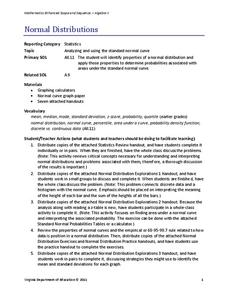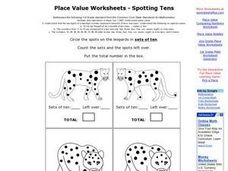EngageNY
The Distributive Property and the Products of Decimals
Make multiplication of decimals easier by applying the distributive property. Pupils investigate how they can use the distributive property to multiply decimals. After learning the strategy, they work on some practice problems at...
Curated OER
Bar Graphs and Pictographs
How are bar graphs and pictographs different? As you begin this concept, use these simple graphs to help get learners started with data analysis styles. There is one bar graph and one pictograph, each accompanied by four or five...
K12 Reader
Estimation
Teach your class a thing or two about making educated mathematical guesses. Learners read a passage that explains estimation and approximate and exact answers. They then respond to five questions about and related to the text.
Curated OER
Equivalent Fraction Paper Strips
Young learners compare the relative values of fractions by making physical representations. They fold and label strips of paper that are equal in length to represent "one whole" and the equal parts that fractions represent. Also, they...
Illustrative Mathematics
Mile High
What is the meaning of sea level? This resource helps your class understand the meaning of elevations above, below, and at sea level. Provides for good discussion on using positive and negative numbers to represent quantities in the real...
Broward County Schools
Women's Contributions to the United States
Betsy Ross, Toni Morrison, Sacajawea, Amelia Earhart, Maya Lin, Sally Ride, Judy Baca. No matter the subject area or the grade level you teach you will find much to value in a manual that focuses on the contributions U.S. women have...
Curated OER
Comparing and Ordering Greater Numbers
Students compare and order greater numbers. In this place value lesson, students use a place-value chart to identify which set of numbers has the greatest value.
Curated OER
Numeracy Assessment
In this math learning exercise, students are assessed on their basic math skills. Included are questions on multiplying and dividing by 10 and 100, place value, basic word problems, rounding, estimating and comparing numbers.
Curated OER
How Much Has Math Changed?
Students solve problems using the opposite, reciprocal and powers. In this algebra instructional activity, students solve problems with inequalities and absolute values. They show understanding of the basic content of math in this...
Curated OER
Whole Numbers
A game is a great way to learn. Study what makes an integers, their traits, and characteristics. This lesson includes 3 separate activities intended to promote an understanding of integers, whole numbers, and opposites. The class is...
Teach Engineering
Discovering Phi: The Golden Ratio
Fe, phi, fo, fum. This activity leads pairs to find the ratio of consecutive terms of the Fibonacci sequence. The pairs find that the Fibonacci sequence can be found in many places. A discussion with the class shows that the ratios found...
Curated OER
Multiplying by Two-Digit Numbers
In this mathematics worksheet, 6th graders find the product of a given equation. Then they use an array and find the sum of the partial products. Students also use zeros as place holders when necessary.
Curated OER
How Much is a Million?
Fifth graders explore the relationship between customary and metric units of measurement. Through discussion and hands-on activities, they discover how units of measurement are related. Students create a millions book to aid in their...
Curated OER
Multiply in Parts
For this multiplication worksheet, students learn to multiply in parts by review the given examples and chart. Students then study the examples of multiplication in parts and multiply the tens and ones separately. Students add to get the...
Curated OER
Put Your Hands on the Values-Math Manipulatives
Fifth graders visit Web sites on the World Wide Web for interactive practice in recognizing place value for numbers. They work in teams of two to practice identifying place values of whole number and decimals by creating place value cards.
Curated OER
Summer Term Math Assessment
In this math learning exercise, students assess their math skills by completing a comprehensive learning exercise covering ordering and comparing numbers, place value, fractions, basic operations, word problems, geometry, time and...
Curated OER
Coin Motion
Learners recognize coins and their values and count coin groups. They play a game where when music is turned on they skip, hop, jog and when it is turned off, they go to a spot in the room marked with the same coin or value as is in...
EngageNY
Divisibility Tests for 3 and 9
Who knew the sum of a number's digits gives such interesting information? The 18th installment of a 21-part module has scholars investigate division by three and nine. After looking at several examples, they develop divisibility tests...
EngageNY
Applications of the Pythagorean Theorem
Begin seeing the world through the lens of geometry! Use the 19th installment in a 25-part module to apply the Pythagorean Theorem to solve real-world problems. Individuals sketch situations resulting in right triangles such as the...
Virginia Department of Education
Normal Distributions
Pupils work to find probabilities by using areas under the normal curve. Groups work to calculate z-scores and solve real-world problems using the empirical rule or tables.
Curated OER
Math Skills-Writing Scientific Notation
In this scientific notation worksheet, students perform basic math functions and express their answers in scientific notation.
Curated OER
McONE Hundredth Day
Students explore the components of a calendar and counting through the preparation and celebration of the "One Hundredth Day" of school. Badges are worn and McDonald fries are enjoyed in the celebration.
Curated OER
Leopards: Spotting 10s
Count the spots on 4 pictured leopards and circle groups of 10. Count the extras. Write how many 10s and how many "left overs" in blank spaces. Write the total number in a box. Can a leopard change its spots? Enrich this math tool by...
Curated OER
Multiplying Decimals
Fifth graders solve 35 multiplication equations, all of which have one number with a decimal multiplied by a single-digit number. The decimal numbers all are single-digit with a decimal only to the tenths place, so this is ideal for...

























